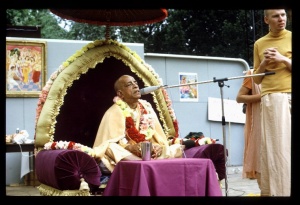CC Madhya 20.125 (1975)

A.C. Bhaktivedanta Swami Prabhupada
Below is the 1996 edition text, ready to be substituted with the 1975 one using the compile form.
TEXT 125
- abhidheya-nāma ‘bhakti’, ‘prema’—prayojana
- puruṣārtha-śiromaṇi prema mahā-dhana
SYNONYMS
abhidheya—activities to revive one’s relationship; nāma—named; bhakti—devotional service; prema—love of Godhead; prayojana—the ultimate goal of life; puruṣa-artha-śiromaṇi—the topmost interest of the living entity; prema—love of Godhead; mahā-dhana—the greatest wealth.
TRANSLATION
“Devotional service, or sense activity for the satisfaction of the Lord, is called abhidheya because it can develop one’s original love of Godhead, which is the goal of life. This goal is the living entity’s topmost interest and greatest wealth. Thus one attains the platform of transcendental loving service unto the Lord.
PURPORT
The conditioned soul is bewildered by the external, material energy, which fully engages him in sense gratification in various ways. Due to engagement in material activities, one’s original Kṛṣṇa consciousness is covered. However, as the supreme father of all living entities, Kṛṣṇa wants His sons to return home, back to Godhead; therefore He personally comes to deliver Vedic literatures like the Bhagavad-gītā. He engages His confidential servants who serve as spiritual masters and enlighten the conditioned living entities. Being present in everyone’s heart, the Lord gives the living entities the conscience whereby they can accept the Vedas and the spiritual master. In this way the living entity can understand his constitutional position and his relationship with the Supreme Lord. As personally enunciated by the Lord Himself in the Bhagavad-gītā (BG 15.15), vedaiś ca sarvair aham eva vedyaḥ: through the study of Vedānta, one may become fully aware of his relationship with the Supreme Lord and act accordingly. In this way one may ultimately attain the platform of loving service to the Lord. It is in the living entity’s best interest to understand the Supreme Lord. Unfortunately, the living entities have forgotten that this is in their best interest, and therefore Śrīmad-Bhāgavatam says, na te viduḥ svārtha-gatiṁ hi viṣṇum (SB 7.5.31).
Everyone wants to achieve life’s ultimate goal, but due to being absorbed in the material energy, we waste our time with sense gratification. Through the study of Vedic literatures—of which the essence is the Bhagavad-gītā—one comes to Kṛṣṇa consciousness. Thus one engages in devotional service, called abhidheya. When the living entity actually develops love of Godhead, he has reached the ultimate goal, prayojana. In other words, one who becomes fully Kṛṣṇa conscious has attained the perfection of life.